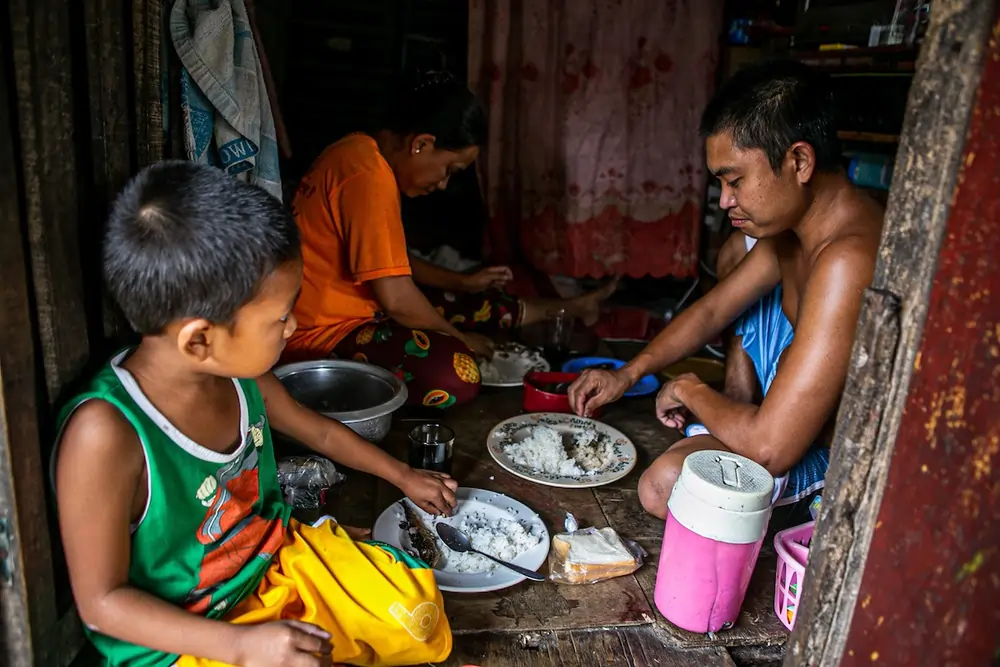Hunger | PH Reached New High 2024

Stay tuned for a deeper dive into the numbers and what they mean for addressing hunger issues in the country.
Table of Contents
Takeaways
- Hunger Incidence Trends:
- SWS regularly monitors hunger incidence in the Philippines through surveys. They categorize hunger into two types: moderate hunger (experiencing hunger “only once” or “a few times” in the last three months) and severe hunger (experiencing hunger “often” or “always” in the last three months).
- Trends in Hunger Rates:
- SWS surveys provide insights into the trends of hunger rates over time. Changes in hunger incidence rates can indicate shifts in economic conditions, food accessibility, and other socio-economic factors impacting food security.
- Geographical Variations:
- SWS surveys often highlight regional variations in hunger incidence across the Philippines. Certain areas may experience higher levels of hunger due to economic disparities, infrastructure challenges, or exposure to environmental risks.
- Impact of External Factors:
- Surveys by SWS may also capture the impact of external factors such as natural disasters, economic crises, or public health emergencies (like the COVID-19 pandemic) on hunger rates and food security.
- Policy Implications:
- Findings from SWS surveys on being hungry and food security can inform policymakers and stakeholders about the effectiveness of existing programs and policies addressing these issues. They can also guide the development of targeted interventions to mitigate hunger and improve food access for vulnerable populations.
- Public Awareness and Advocacy:
- SWS surveys contribute to raising public awareness about starvation and food insecurity issues in the Philippines. The dissemination of survey results can stimulate public discourse, advocacy efforts, and community initiatives aimed at addressing underlying causes of hunger.
Introduction
Filipino families experiencing a new high when it comes to hunger this month. The poll was created by SWS and found out that 14.2% of Filipino families were hungry or had nothing to eat.
The survey results are based on face-to-face interviews with 1,500 adults nationwide, with sampling error margins at 2.5%.
The rise in starvation levels came from the increase in hunger incidence from Metro Manila, Visayas and Balance Luzon, while Mindanao experienced a decline.
At least 19% of families in Metro Manila reported experiencing involuntary hunger — the highest in the country — followed by Balance Luzon (Luzon outside Metro Manila) at 15.3%, Visayas at 15% and Mindanao at 8.7%.
The issue of starvation in the Philippines has escalated to alarming levels in 2024, posing significant challenges for the population. This review delves into the factors driving this crisis, its consequences, and potential solutions.
Factors Contributing to Increased Hunger
Economic Challenges
Economic instability, exacerbated by global factors and local policy issues, has led to widespread poverty. Many families struggle to afford basic necessities, resulting in heightened food insecurity.
Disruptions in Supply Chains
The disruption of supply chains due to the COVID-19 pandemic has further restricted access to food, causing prices to rise. This has particularly impacted vulnerable communities, pushing more individuals into being hungry.
Environmental Factors
Natural disasters, such as typhoons and floods, have ravaged agricultural regions, leading to crop failures and reduced food production. Climate change continues to threaten food security across the country.
Impact on Society
Health Implications
Rising starvationlevels have severe health implications, especially for children and pregnant women. Malnutrition rates are likely to rise, leading to long-term health problems and reduced productivity.
Social Unrest
Increased starvation often correlates with social unrest and political instability. Food scarcity can amplify existing societal tensions, further complicating governance and public welfare efforts.
Government Response and Challenges
Relief Efforts
The Philippine government has initiated relief programs to address immediate hunger needs. These efforts include food aid distribution and subsidies, but they face logistical challenges and funding constraints.
Long-Term Solutions
To combat it sustainably, investments in agriculture, infrastructure, and social welfare programs are crucial. Enhancing rural development and expanding access to education and healthcare are essential components of a comprehensive strategy.
What to do?
Action Steps to Address Hunger in the Philippines
Addressing the crisis in the Philippines requires a multifaceted approach involving various stakeholders and coordinated efforts. Here are actionable steps that can be taken:
1. Strengthen Social Safety Nets
Expand Food Assistance Programs: Increase funding for food assistance programs targeting vulnerable populations, such as low-income families, children, pregnant women, and the elderly.
Implement Cash Transfer Programs: Introduce or enhance cash transfer programs to provide direct financial assistance to households struggling with food insecurity.
2. Enhance Agricultural Resilience
Invest in Agriculture: Increase investment in agriculture, including irrigation systems, seed banks, and climate-resilient farming techniques to improve food production and ensure stability against environmental challenges.
Support Smallholder Farmers: Provide support and resources to smallholder farmers, including access to markets, credit, and agricultural extension services.
3. Improve Access to Education and Healthcare
Promote Nutrition Education: Integrate nutrition education into school curricula and community health programs to raise awareness about balanced diets and healthy eating habits.
Expand Healthcare Services: Ensure access to affordable healthcare services, especially for maternal and child health, to combat malnutrition and related health issues.
4. Foster Employment and Livelihood Opportunities
Create Jobs: Promote job creation through infrastructure projects and investment in industries that provide stable employment opportunities, thereby increasing household income and reducing food insecurity.
Support Microenterprise Development: Facilitate the establishment and growth of microenterprises by providing training, credit, and market linkages to enable income generation at the grassroots level.
5. Strengthen Governance and Accountability
Enhance Policy Coordination: Improve coordination among government agencies, NGOs, and private sector partners involved in food security initiatives to maximize impact and minimize duplication of efforts.
Ensure Transparency and Accountability: Strengthen monitoring and evaluation mechanisms to ensure that resources allocated for food security are used effectively and reach those in need.
6. Promote Sustainable Development Goals (SDGs)
Align Strategies with SDGs: Integrate food security and nutrition goals into broader development strategies aligned with the United Nations Sustainable Development Goals (SDGs) to foster holistic and sustainable progress.
7. Mobilize International Support
Engage International Partners: Collaborate with international organizations, donor agencies, and development partners to mobilize resources and expertise for comprehensive food security programs in the Philippines.
By implementing these action steps, the Philippines can make significant strides in reducing hunger and improving food security for its population, ultimately fostering a healthier, more resilient society.
SWS
The Social Weather Stations (SWS) is a well-known Philippine-based polling organization that conducts surveys on various social, political, and economic issues affecting the country. SWS is renowned for its public opinion polling and research, providing valuable insights into public sentiment and trends across different sectors of Philippine society.
SWS conducts regular surveys on topics such as political preferences, public satisfaction with government performance, economic conditions, poverty incidence, and other social concerns, including hunger and food security. Their surveys are widely respected and used as a basis for policy discussions and decision-making.
If you have specific questions about recent SWS surveys or findings related to hunger or other social issues in the Philippines, feel free to let me know, and I can assist you further!
Disclaimer
Certainly! When discussing survey data or research findings, it’s important to include a disclaimer to provide context and clarify the scope of the information. Here’s an elaboration on the teaser with a disclaimer:
“New survey data from SWS, a reputable polling organization in the Philippines, highlights emerging trends in hunger across the country. These findings reflect the views and experiences of survey respondents during a specific period and are subject to sampling limitations and statistical margins of error. While the data offers valuable insights into prevailing hunger patterns, it’s essential to interpret them within the context of broader socio-economic conditions and regional variations. Stay tuned for a detailed analysis of the survey results and their implications for addressing food insecurity in the Philippines.”
This disclaimer acknowledges the source of the survey data (SWS), emphasizes the limitations inherent in survey research, and encourages a nuanced interpretation of the findings within a larger context of socio-economic factors impacting hunger and food security. It sets the stage for a comprehensive discussion of the survey results while maintaining transparency about the data’s scope and implications.
Conclusion
In conclusion, the surge in hunger in the Philippines in 2024 is a multifaceted crisis requiring urgent attention. Addressing this issue demands coordinated efforts from governments, NGOs, and international partners to implement short-term relief measures while fostering long-term solutions for food security and poverty alleviation.
The escalating levels of hunger in the Philippines in 2024 are emblematic of broader systemic issues that require immediate and sustained action. As the nation grapples with economic challenges, supply chain disruptions, and environmental threats, the impact on public health and social stability cannot be overstated.
To address this crisis effectively, a concerted effort is needed from all stakeholders. The government must prioritize comprehensive relief efforts while simultaneously investing in long-term solutions such as sustainable agriculture, infrastructure development, and social welfare programs. Collaborative action, both domestically and internationally, is essential to mitigate the immediate impacts of hunger and to build a resilient future for all Filipinos.
ADVERTISEMENT

Jom Bourie a professional poker player and an author of books about poker. Boasts an impressive 37-year tenure in the gambling industry, with a passion for gaming that has earned him a reputation as a trusted and knowledgeable figure. His dedication to precision, integrity, and transparency has enabled him to provide players with unparalleled insights and recommendations for exceptional online gaming experiences.
His videos have been viewed more than 22 million times on YouTube and his casino travel articles have appeared in magazines. He has also written numerous articles for gaming magazines circulation gaming magazines.